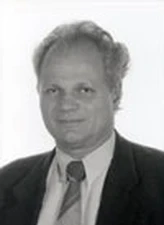Michael Ghil

The 2004 Lewis Fry Richardson Medal is awarded to Michael Ghil for his fundamental research on testing and improving climate models based on nonlinear analysis of geophysical time series.
Michael Ghil is Professor of Atmospheric Sciences and Geophysics and the Director of the Institute of Geophysics and Planetary Physics at the University of California, Los Angeles. His outstanding research is mainly related to the application and development of advanced mathematical methods to challenging topics in climate dynamics. He is world-wide famous for his original and challenging approaches to validate and modify climate models by analysing observed data series.
Among many outstanding achievements of M. Ghil, the following ones are emphasized:
He studied atmospheric variability, multiple flow-regimes, and blocking phenomena with the help of atmospheric modelling, cluster-analysis, and multivariate probability density functions, increasing our knowledge about the predictability of atmospheric motions.
Modern methods of time series analysis and their applications in earth sciences are another focus of his work: he combined mathematical tools like the singular-spectrum analysis, the maximum entropy method, the extended Kalman filtering and the multi-taper method in a toolkit for short and noisy, chaotic signals which typically occur in climate data sets and used this for the study of paleoclimatic time series, interseasonal oscillations in the global atmosphere, tropical air-sea interaction in GCMs and others.
Several papers are devoted to the El Niño phenomenon in the Pacific: M. Ghil showed that the irregularity could be explained by nonlinear resonance of the intrinsic dynamics with the Earth’s annual cycle.
Other very successful research of M. Ghil include the dynamics of paleoclimate, the wind-driven double-gyre in ocean dynamics, remote sensing and data assimilation, dynamo theory, and celestial mechanics.
M. Ghil was chairman of the Scientific Advisory Council of the Community Climate System Modeling Program between 1988 and 1999, and he is advisor of the Applied Mathematical Sciences Series (Springer-Verlag).
Publication resulting from this medal
Ghil, M.: Review article: Hilbert problems for the climate sciences in the 21st century – 20 years later, Nonlin. Processes Geophys., 27, 429–451, https://doi.org/10.5194/npg-27-429-2020, 2020.
